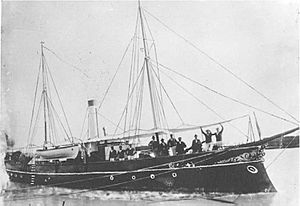Bistrița-class cruiser facts for kids

Bistrița
|
|
Quick facts for kids Class overview |
|
|---|---|
| Name: | Bistrița-class cruiser |
| Builders: | Thames Iron Works, London |
| Operators: | |
| Built: | 1888 |
| In service: | 1888–1949? |
| Completed: | 3 |
| Retired: | 3 |
| General characteristics | |
| Type | Coastguard cruiser |
| Displacement | 100 tons (1947) |
| Length | 30.48 meters |
| Beam | 4.11 meters |
| Draft | 1.75 meters |
| Propulsion | 380 hp |
| Speed | 12 knots |
| Range | 12 tons of coal |
| Complement | 30 |
| Armament |
|
The Bistrița class was a group of three small ships called coastguard cruisers. They belonged to the Romanian Navy. These ships were active for a very long time, serving from 1888 until at least 1949.
Contents
Building the Bistrița-class ships
These three cruisers were built in London, England, in 1888. A company called Thames Iron Works constructed them. The ships were named Bistrița, Oltul, and Siretul.
What made them special?
Each ship weighed about 96 tons. This is how much water they pushed aside when floating. They were about 30 meters (100 feet) long. That's roughly the length of three school buses!
They were also about 4 meters (13 feet) wide. The ships could go about 12 knots, which is around 22 kilometers per hour. They carried 12 tons of coal to power their engines.
Ship's weapons and crew
The main weapon on each ship was a 57 mm gun. This is like a small cannon. They also had a smaller 37 mm gun. Each ship had a crew of 30 sailors.
Their time in service
The Bistrița-class ships were part of the Romanian Navy for many years. They played a role during the First World War. This was a major global conflict.
Serving in two World Wars
Amazingly, all three ships survived the Second World War too. They were still in use in 1947. By then, they were called "river gunboats." Their speed and weapons were still the same. The last time they were mentioned was in 1949. This means they served for over 60 years!
When the Bistrița-class ships were new, they were similar to some Italian ships. For example, the Italian Folgore class class was also armed with 57 mm and 37 mm guns. Both types of ships were small cruisers, weighing less than 400 tons.
 | Frances Mary Albrier |
 | Whitney Young |
 | Muhammad Ali |

